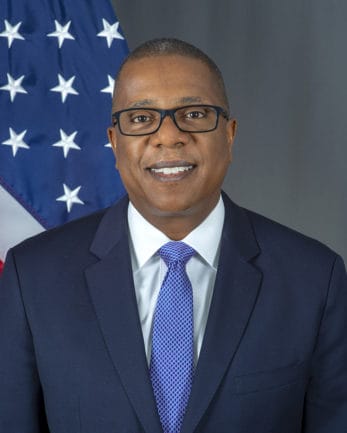The United States of America has said the only way Zimbabwe President Emmerson Mnangagwa could rescue his country from the agonising economic predicament it finds itself in was only if it advocated for the comprehensive reform process and also the pursuance of inclusive engagement of various stakeholders in dialogue.
According to the US Ambassador to Zimbabwe Brian Nichols, while dialogue and reforms were a viable alternative towards bringing a lasting solution to the current political and socio-economic challenges, regional bloc Sadc, to which Zimbabwe is a member, must play a pivotal role in bringing to an end, the apparently endless crises bedeviling the country.
Ambassador Nichols cited a number of concerns such as an appalling dearth in democratic practices and rampant human rights violations blamable on the Mnangagwa regime, as hindrances towards the fight against Zimbabwe’s problems.
“I think there is a crisis in Zimbabwe,” Nichols, who has often been branded a ‘thug’ by the authorities in Harare told Sunday Times.
“We have seen those rights are systematically being ignored by the government and that is very worrisome and if you look at statements that have been put out by the (Catholic) Bishops’ Conference, Zimbabwe Council of Churches, various human rights organisations, various civic organisations, lawyers here, there is a widespread concern about where Zimbabwe is headed in all of those areas and that is something that people who are legitimate friends of the Zimbabwean people are deeply worried about,” he said.
On the role Sadc could play on Zimbabwe, the Ambassador said:
“This is an opportunity for the institution (Sadc) to stand up to the excesses that are taking place here in terms of human rights abuses. And this is an opportunity for Sadc to promote a more prosperous region”.
His sentiments come at a time when Sadc and the continental block African Union (AU) have been accused of being toothless dogs when it comes to the long-drawn-out Zimbabwe crisis.
South African President Cyril Ramaphosa recently dispatched envoys to Zimbabwe but their visit to Harare has been shrouded in controversy with poorly evidenced accusations insinuating that Mnangagwa personally blocked the envoys from meeting opposition MDC Alliance leader Nelson Chamisa and various other stakeholders.
But Nichols lauded Ramaphosa’s move as a right step in the right direction.
He also added that the US has, for long engaged Mnangagwa and his administration but said he was wary that the Zanu PF regime has literally dithered in matters to do with enacting reforms.
Added Nichols:
“When I walk around the streets of Zimbabwe, the concerns that I hear are from people who can’t afford and do not have resources to achieve their needs as their dreams for a better future become more distant than ever and you see that in many Zimbabwean people trying to migrate, you see that in expressions on social media, the July 31 calls for protests, you see that in statements by various church groups in Zimbabwe and addressing those concerns collectively from the Zimbabwean people is vital and I think that role of South Africa is very important”.
Since the reign of deposed dictator Robert Mugabe, Harare has had terrible diplomatic relations with the global economic powerhouse following a controversial and characteristically populist land policy which drove productive former white farmers off the vast tracts of land they worked on.
private media
Additional Reporting: Zwnews













